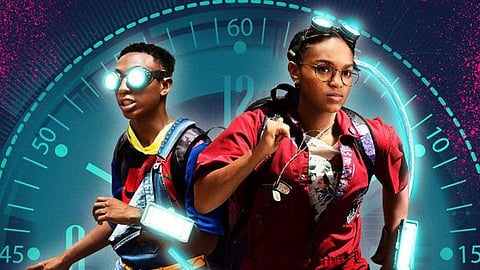

On the surface, Stefon Bristol's See You Yesterday seems like this era's Back to the Future. There are several callbacks to that classic sci-fi franchise, including a cameo from Marty McFly himself. But this Netflix film is more than just goofy time-traveling fun. It owes just as much to the work of Spike Lee, who has incidentally also produced it. Bristol's film touches upon the harsh realities of living in America as a black person. On how violence permeates the lives of peoples of colour in that country. And it does so through the story of a young black girl from Brooklyn, CJ Walker (Eden Duncan-Smith) who, along with her best friend, Sebastian Thomas (Danté Crichlow), invents a time travel device and subsequently ends up using it to try to save her brother (rapper-actor Astro) from being killed by the police. So, in a sense, there's a touch of Jordan Peele here too. Bristol, like Peele, uses genre (sci-fi in this case) elements to address issues of race and violence.
But going back to Spike Lee, that master filmmaker's influence extends not just to the themes but also the setting of this story — Brooklyn. A few minutes into the film, there's a title card that proudly reads 'East Flatbush Brooklyn'. As with some of Lee's most iconic films, here too, Brooklyn — this particular neighbourhood of it — has a starring role. Bristol's love for the neighbourhood is obvious is in every frame, and every background character and detail that fills these frames. The film feels lived in. The music too adds to this effect. The soundtrack is full of reggae and soca music — the music of the Caribbean (East Flatbush has a large population of West Indian immigrants — Sebastian is shown to be Guyanese). The attention to detail is wonderful and is definitely one of the highlights of See You Yesterday.
Another highlight is the wonderful cast, led by the marvelously talented Eden Duncan-Smith. She holds the film together with her riveting performance as Claudette Josephine (CJ) Walker, the brilliant teenager who is as flawed as she is smart. Just seeing such a character, usually assigned to white men, written as a black woman is quite thrilling. Add to that, she's written not as this perfect being, but a regular stubborn teenager, warts and all. Bristol shares writing credits with Fredrica Bailey, and it's always striking to note what a difference it makes when a woman writer is on board, especially when writing women characters. The scene where CJ pushes Sebastian away when he tries to comfort her after a setback, with a brusque "Get off me. I don't need a f***ing hug" is so real and says so much about her as a person and their dynamic as friends. And speaking of friendship, the scene that has CJ saying, "I love you, black man," and Sebastian responding with, "I love you too, black woman," had me cheering wholeheartedly for this lovely duo.
The film loses its way a little when the time travelling gets more and more complicated. The explanations and hand-waving might also bother you if you come at this from a purely sci-fi perspective. This is, after all, a film that takes its inspiration from the DeLorean school of sci-fi and it is, therefore, best to liberally suspend disbelief in these portions. What's important here is the metaphorical point the director makes about how it's well-nigh impossible to break the cycle of violence. And this, sadly, rings only too true.
The ending blindsided me at first, but after a little reflection, it not only made sense, but also elevated the film in my eyes. It seems to me an empowering ending that impresses upon us the importance of continuing to fight in the face of continual setbacks. The importance of never giving up the fight for justice, especially in these troubled times. And making a film such as this is part of that fight. A film that represents a marginalised, oppressed community, that tells their story, that records their lives, that brings them into the mainstream, is empowering in and of itself. And, in my opinion, as important as any other act of activism.